Teacher Report Writing
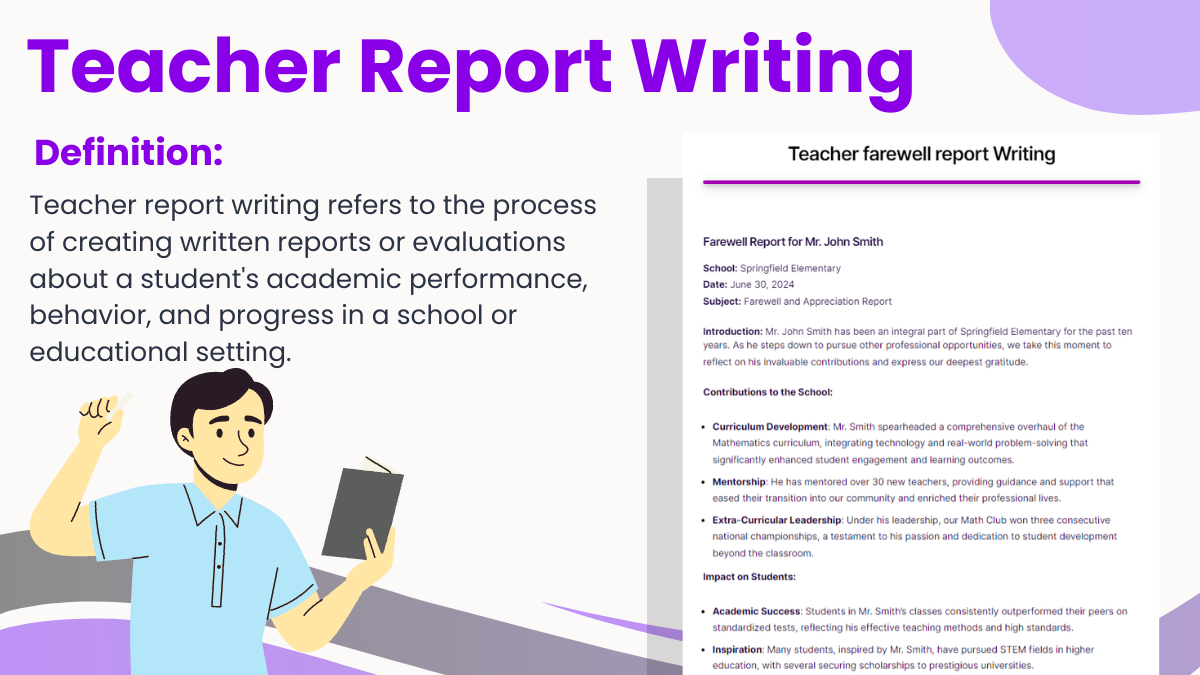
Many may assume if you have already outgrown school or have graduated from school that you can escape reports. Unfortunately, that is not the case in any way. But it does not mean that this is considered a bad thing either. In a way, school taught you how to write reports of any kind, so in the real world, you would not have any issues whatsoever when it comes to reports. Whether you are a police officer, an employee in a company, an intern in an organization or a teacher or basically anyone, you would always encounter one or more reports.
To make it as frank as possible, you cannot avoid writing or filling out reports. For whatever reason, reports are always important one way or the other. For teachers, report writing is essential. As this is one of the ways to show that their students progress to their parents. In addition to that, report writing can also be used for teacher’s personal research for their class or for a higher educational purpose. For teachers out there, how do you explain your report writing to a parent?
What is Teacher Report Writing?
Teacher report writing refers to the process of creating written reports or evaluations about a student’s academic performance, behavior, and progress in a school or educational setting. These reports are typically generated by teachers or educators and are often a formal requirement in educational institutions.
The purpose of teacher report writing includes:
- Assessment: To assess and document a student’s academic achievements and progress over a specific period.
- Communication: To communicate a student’s performance and areas of improvement to parents, guardians, or relevant stakeholders.
- Feedback: To provide constructive feedback on a student’s strengths and weaknesses, helping them and their families understand their educational development.
- Planning: To assist in planning and implementing tailored educational strategies or interventions to support the student’s growth.
Teacher report writing typically covers various aspects, including:
- Academic Performance: Assessment of a student’s performance in subjects or courses, including grades, test scores, and class participation.
- Behavior and Attitude: Evaluation of a student’s behavior in the classroom, their attitude toward learning, and their interactions with peers and teachers.
- Progress: Documentation of a student’s progress compared to previous reports or benchmarks.
- Areas of Improvement: Identification of specific areas where the student can improve or areas that require attention.
- Achievements: Recognition of a student’s achievements, awards, or accomplishments during the reporting period.
- Recommendations: Suggestions for actions or strategies that can help the student succeed academically or behaviorally.
What is the format of a good report writing?
Title Page:
- Title of the Report
- Author’s Name
- Date of Submission
- Name of the Organization or Institution (if applicable)
2. Abstract:
- A brief summary of the report’s purpose, methods, key findings, and conclusions.
- Typically, it should be concise, ideally not exceeding 150-250 words.
3. Table of Contents:
- A list of sections and subsections in the report, along with corresponding page numbers. This helps readers navigate the report easily.
4. List of Figures and Tables (if applicable):
- A list of all figures and tables included in the report, with corresponding page numbers.
5. List of Abbreviations and Acronyms (if applicable):
- An alphabetical list of abbreviations or acronyms used in the report, along with their meanings.
6. Introduction:
- Provide context and background information about the report’s topic.
- Clearly state the report’s purpose, objectives, and scope.
- Present a brief outline of the report’s structure.
7. Literature Review (if applicable):
- Summarize relevant prior research, theories, and concepts related to the report’s topic.
- Provide a critical analysis of existing knowledge in the field.
8. Methodology:
- Explain the research methods or procedures used in the report, including data collection, sampling, and analysis.
- Justify the chosen methods and discuss any limitations or ethical considerations.
9. Findings:
- Present the main results or findings of the report, typically using charts, tables, graphs, or textual descriptions.
- Organize findings logically and use clear headings and subheadings.
10. Discussion:
- Interpret and analyze the findings in the context of the research objectives.
- Discuss implications, patterns, and relationships observed in the data.
- Address any limitations or challenges encountered during the research.
11. Conclusion:
- Summarize the key points and findings of the report.
- Clearly state the conclusions drawn from the research and their significance.
- Make recommendations, if appropriate.
How to Write a Teacher Report?
Given the chance to rewrite what you already know of what a teacher report is, you would of course take the opportunity and revise what you used to know and apply what you already know. Come take a look at these five simple ways to write a teacher report.
1. Use Simple but Clear Jargon
First on the list we have is, using simple but clear jargon. Let’s face it, a lot of us make this mistake. We assume that everyone understands what we are trying to say, but quite frankly, not everyone does. To avoid this kind of misunderstanding, use simple but clear jargon. Basically you don’t have to sound fancy when you can use simple words to make your point across.
2. Always Be Clear and Concise
Whether you are writing your report card for your students or you are writing something for your research, always make sure to be clear and concise. Remember that you are not the only audience to your research or to the progress report card you are making. Apart from using simple and clear jargon, you should also make sure that you are making enough sense.
3. Give Some Examples to Prove Your Point
Writing your research, it is always best to give some examples. This is used to prove your point and to make your explanations easier to understand. When you are making your report card for your students, a good example to show would be from a general point of view. Avoid comparing your students’ progress with another student. This would only lead to the parents getting angry and would put you in a bad light.
4. Use the Instructions Given by Your School
Depending on the school and their way of writing their reports, it is always best to check before you do. This is so that you will not be wasting your time and effort, as well as it is to show that you understand the rules you are following when writing your reports. As all schools may differ in some general way of writing, follow what is taught to you.
5. Revise the Report You Are Writing
The last one but still the most important part of your writing a report is revision. Revise anything that may come off as confusing or out of the topic. Revising your report, especially the comments section for your report card is helpful. This is simply to show that how you want your point to be taken is important as well as a good communication between you and the parent or you and the reader. Your report must at least be seen as something professional.
What is the Best examples of report writing?
Title: “The Impact of Social Media on Youth: A Comprehensive Analysis”
Abstract: This research report examines the influence of social media on the behavior and well-being of young individuals. The study investigates the extent to which social media platforms affect self-esteem, mental health, and interpersonal relationships among the youth. Through surveys, interviews, and data analysis, the report provides valuable insights into this growing concern.
Table of Contents:
- Introduction
- Literature Review
- Methodology
- Data Analysis
- Findings
- Discussion
- Conclusion
- Recommendations
- References
1. Introduction:
- Background information on the rise of social media.
- Statement of the research problem.
- Objectives of the study.
2. Literature Review:
- Overview of existing research on social media and its effects on youth.
- Theoretical frameworks used to analyze the impact.
3. Methodology:
- Description of research design and data collection methods (surveys, interviews, content analysis).
- Sampling techniques and participant demographics.
- Ethical considerations.
4. Data Analysis:
- Presentation of survey results, including charts and graphs.
- Thematic analysis of interview data.
- Discussion of findings.
5. Findings:
- Summarized results, highlighting key trends and statistics.
- Quotes from interviewees to illustrate personal experiences.
6. Discussion:
- Interpretation of findings in the context of the research objectives.
- Comparison of results with prior studies.
- Discussion of the implications of social media use on youth.
7. Conclusion:
- Summary of the research’s main findings.
- Statement of the report’s contributions and limitations.
8. Recommendations:
- Suggestions for addressing the negative effects of social media on youth.
- Areas for further research.
9. References:
- Properly formatted citations of all sources used in the report.
5+ Teacher Report Writing Samples
- Teacher Report Writing in Primary School
Teacher Report Writing in High School
Teacher Report Writing to els Student
Teacher farewell report Writing
Teacher Report Writing for Participation and Social Skills
11+ Teacher Report Writing Examples
1. Teacher Classroom Observation Report Template
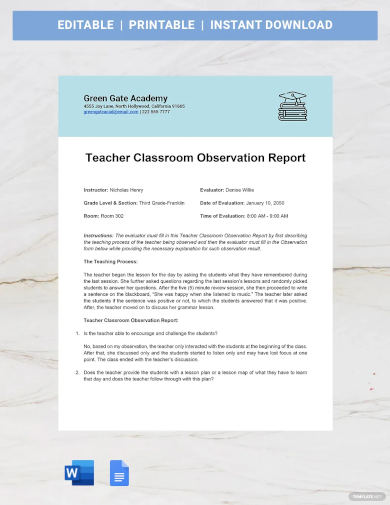
2. Sample Teacher Research Report Writing
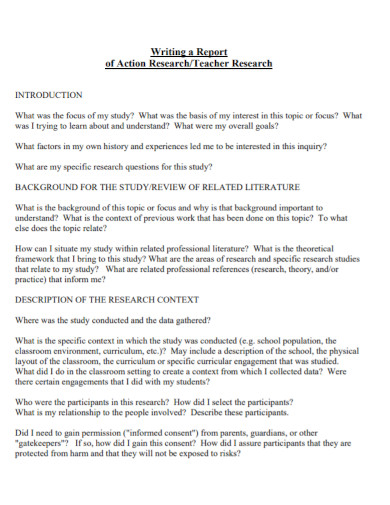
3. Teacher Report Writing Format Template
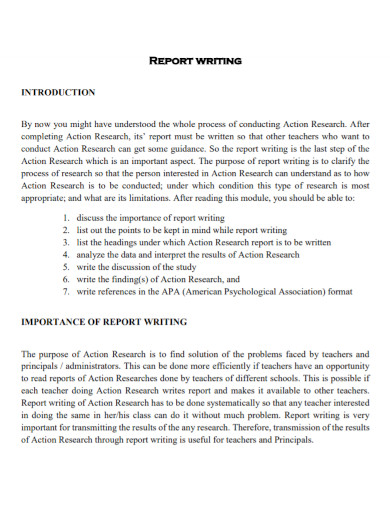
4. Report Writing on Teachers Day
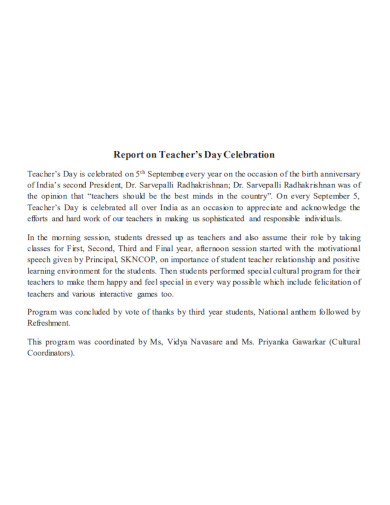
5. Teacher Writing Report Card
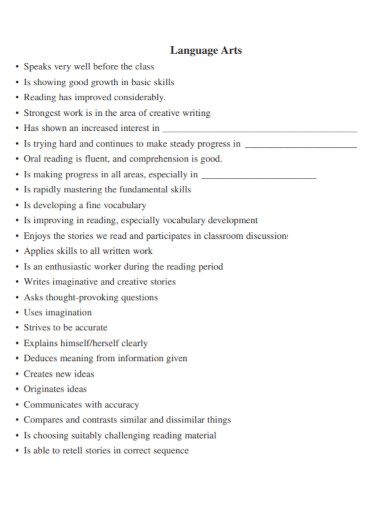
6. Teacher Writing Training Report
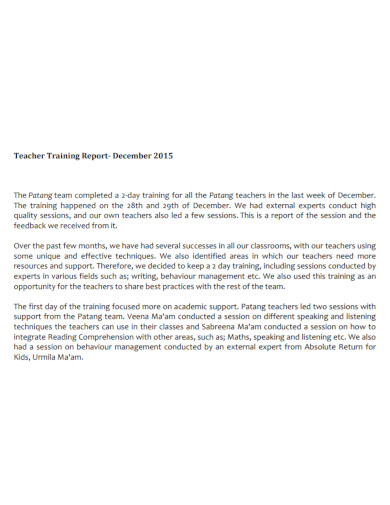
7. Professional Teacher Report Writing
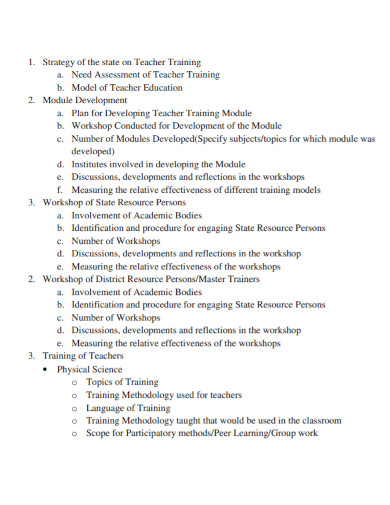
8. Basic Teacher Report Writing
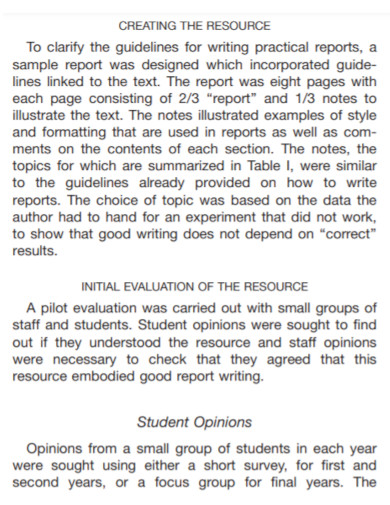
9. Formal Teacher Report Writing
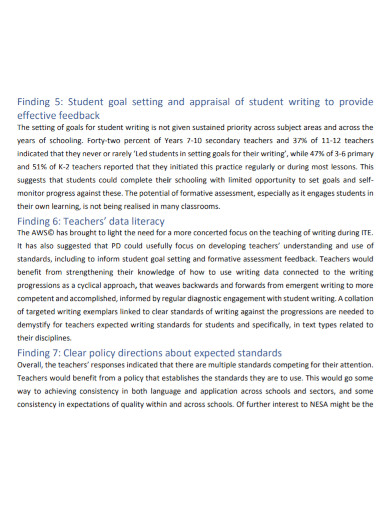
10. Classroom Teacher Report Writing
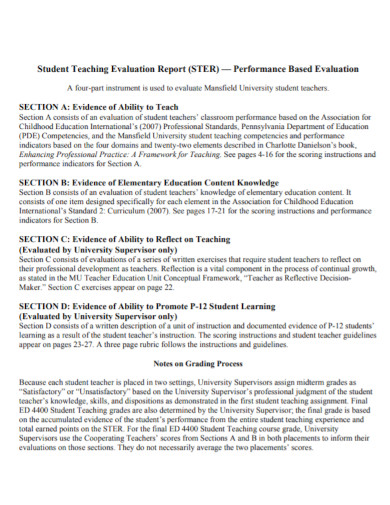
11. School Teacher Report Writing
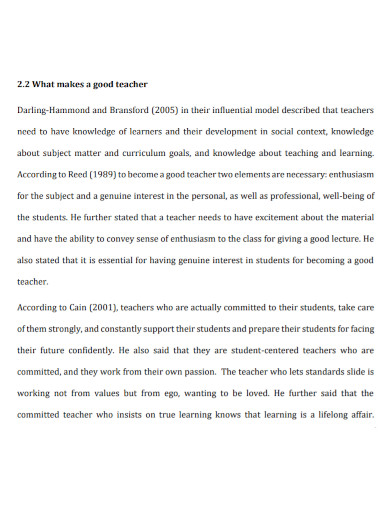
12. Teacher Report Writing Questionnaire
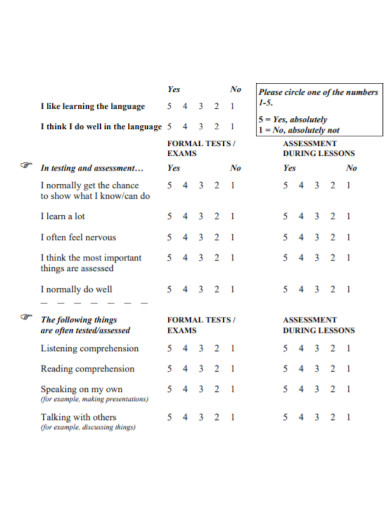
How is a good report written?
Understand the Purpose:
- Clearly understand the purpose and scope of the report. Identify the key questions or issues that the report aims to address.
2. Research and Gather Information:
- Collect all the necessary information, data, and sources relevant to the report’s topic.
- Ensure that your information is accurate, up-to-date, and from reliable sources.
3. Plan and Outline:
- Create an outline or structure for your report. Identify the main sections, subheadings, and the logical flow of information.
4. Write a Clear Introduction:
- Begin with an engaging introduction that provides context and sets the stage for the report.
- State the purpose, objectives, and scope of the report.
5. Provide Background Information:
- Offer background information on the subject matter to ensure readers understand the context.
6. Organize the Main Body:
- Present the main content of the report in a logical sequence.
- Use clear headings and subheadings to separate different sections.
- Follow a coherent and systematic structure.
7. Use Clear and Concise Language:
- Write in clear, concise, and jargon-free language.
- Avoid overly complex sentences and technical terms unless necessary.
8. Support with Evidence:
- Provide evidence, data, examples, or citations to support your statements.
- Use charts, tables, and graphics where appropriate to enhance clarity.
9. Analyze and Interpret Findings:
- Analyze the data or information presented and interpret the results.
- Offer explanations, insights, and conclusions based on the findings.
10. Make Recommendations (if applicable):
- If the report’s purpose involves recommendations, provide clear and actionable suggestions.
- Ensure your recommendations are well-justified by the report’s findings.
What are the 7 steps of report writing?
Define the Purpose and Scope:
- Clearly understand the purpose of the report and its intended audience.
- Define the scope of the report, including what it will cover and any specific questions or issues it should address.
2. Research and Data Collection:
- Gather all the necessary information, data, and sources related to the report’s topic.
- Ensure that your information is accurate, relevant, and from reliable sources.
3. Plan and Outline:
- Create an outline or structure for the report. Identify the main sections and subheadings, establishing the logical flow of information.
4. Write the Introduction:
- Start with an engaging introduction that provides context and explains the purpose and objectives of the report.
- Clearly state what the report aims to achieve.
5. Develop the Main Body:
- Organize the main content of the report into sections and subsections, following the outline.
- Present the information in a logical, coherent, and systematic manner, using clear headings.
6. Analyze and Interpret Data:
- Analyze the data, information, or evidence presented in the report.
- Interpret the findings, providing explanations, insights, and conclusions based on the analysis.
7. Conclude and Make Recommendations (if applicable):
- Summarize the key points and findings from the report in the conclusion.
- If applicable, provide clear, well-justified recommendations based on the report’s findings and analysis.
FAQs
What is a teacher report writing?
A teacher report writing is a document that you write to either use as a progress report, or a research report. This consists of the information you gathered either for research or for making your student’s progress card.
What is the purpose of this report?
The purpose of writing this report is to give out information to the right audience. If you are writing a progress report, you are going to be writing about the productivity of your student and explaining it to their parents. If you are writing a research report, you are going to be explaining your views to your readers.
What should be avoided when writing a teacher report?
There are a lot of things you should avoid, one of which is erasures. It makes the report less professional to look at. Another would be fabricating your report. Avoid this at all costs. Especially when you are doing your research. This is a huge no and should not be encouraged.
When it comes to writing reports, a lot of us may see this as a daunting task. A task that is best left for later or never at all. But what we fail to realize is that reports are quite useful for just about anyone. For teachers, this kind of tool is useful when it comes to doing their students’ progress report. It is also useful when it comes to doing research. Whether we may find this a daunting or for some a pointless task, it is without a doubt that reports are still a useful tool and should be seen as a useful tool.














